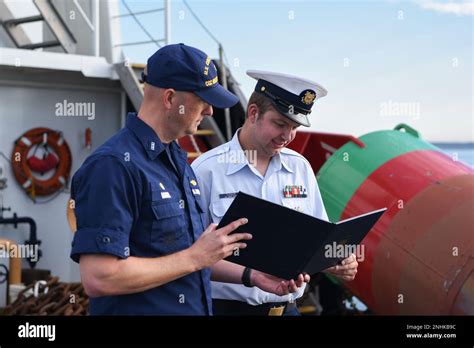In the vast expanse of the world's oceans, a profound desire lingers within the hearts of many individuals - a burning longing to lead, to navigate the ever-changing tides, and to command vessels that traverse the waters. This insatiable yearning drives those who possess it to embark on a remarkable journey, where courage, expertise, and unwavering determination converge to mold their destinies as maritime captains.
While sailing through the realms of maritime exploration, one must navigate a diverse array of experiences and challenges, each presenting an opportunity for growth and development. The path to becoming a captain is not solely paved by academic knowledge but also by a deep understanding of the ocean's tempestuous temperament. It requires an individual who possesses an innate sense of leadership, the ability to make split-second decisions, and the resilience to weather the storms that life at sea inevitably brings.
Embracing the ocean's vastness and its siren call, aspiring captains immerse themselves in a world abundant with opportunities for personal and professional growth. From maritime academies to on-the-job trainings, each step along the way provides valuable experiences that allow them to hone their skills and expand their knowledge.
As they embark on their voyage towards mastery, prospective captains grasp the importance of undertaking various nautical certifications and licenses. These qualifications not only bestow individuals with the credentials to navigate vessels but also instill upon them the confidence and credibility to command the respect of their crew and fellow mariners alike.
Embarking on the Path to a Maritime Career

Welcome aboard to the beginning of an exhilarating voyage towards a rewarding maritime profession. This section delves into the key steps and considerations involved in launching a successful career at sea. From acquiring the necessary qualifications to gaining practical experience, this guide will navigate you through the fundamental aspects of setting sail on your maritime journey.
1. Choosing your Course: The first step towards realizing your ambition is selecting the right educational path. Numerous maritime courses are available that can equip you with the essential knowledge and skills needed to embark on a successful career. From maritime studies to marine engineering or navigation, explore the various disciplines to find the one that aligns with your interests and aspirations.
2. Obtaining the Required Certifications: Pursuing a maritime career requires meeting specific industry standards and acquiring relevant certifications. Research the necessary certifications and licenses for your chosen field, such as the Standards of Training, Certification, and Watchkeeping (STCW) certification, which establishes the minimum requirements for seafarers' training, certification, and watchkeeping.
3. Gaining Practical Experience: Supplementing theoretical knowledge with practical experience is crucial for future maritime professionals. Seek opportunities to gain hands-on experience through internships, apprenticeships, or practical training programs. Engaging in these practical experiences will not only enhance your skill set but also provide valuable insights into the realities of the maritime industry.
4. Building a Professional Network: Networking plays a significant role in career development in any industry, and the maritime sector is no exception. Attend industry events, connect with professionals through online platforms, join relevant associations or organizations, and make an effort to build relationships within the maritime community. These connections can open doors to mentorship opportunities, job leads, and valuable advice from experienced individuals.
5. Staying Informed: The maritime industry is evolving constantly, influenced by technological advancements, regulatory changes, and emerging trends. It is essential to stay up-to-date with the latest news, developments, and industry insights. Regularly reading maritime publications, following industry blogs, and joining relevant forums or discussion groups will keep you informed and enhance your understanding of the maritime landscape.
Embarking on a maritime career is not solely about fulfilling a dream; it is a calculated and strategic undertaking that requires meticulous planning and dedication. Taking these initial steps will lay a solid foundation for your future success as you set sail towards a fulfilling and prosperous maritime profession.
Navigating the Seas: Essential Skills for the Future Captain
In the pursuit of a career as a captain, there are certain skills that are indispensable for success. These skills encompass various aspects, ranging from practical knowledge to leadership abilities, that enable a captain to navigate the vast and unpredictable seas with confidence and expertise.
- Seamanship: A captain must possess a thorough understanding of seamanship, which involves the practical skills required to handle a vessel. This includes knowledge of navigation, maneuvering, and handling different types of ships in varying weather conditions.
- Communication: Effective communication is essential for a captain to convey orders, collaborate with the crew, and ensure smooth operations onboard. Clear and concise communication skills are crucial for coordination and cooperation in demanding maritime scenarios.
- Crisis Management: Navigating the seas can present unexpected challenges, and a captain must be prepared to handle emergency situations. The ability to think calmly under pressure, make quick decisions, and effectively manage crises is vital for the safety of the crew and the vessel.
- Leadership: As the ultimate authority onboard, a captain must possess strong leadership qualities. This includes the ability to inspire and motivate the crew, foster a positive work environment, delegate tasks efficiently, and ensure effective teamwork for the smooth operation of the ship.
- Problem-Solving: The maritime environment often presents complex problems that require logical and innovative solutions. A captain must possess excellent problem-solving skills, enabling them to analyze situations, identify potential risks, and implement appropriate measures to overcome challenges.
- Adaptability: The seas can be unpredictable, and a captain must be adaptable to changing circumstances. This involves the ability to adjust navigation plans, modify strategies, and make quick decisions in response to changing weather conditions, mechanical issues, or any other unforeseen circumstances.
Developing and honing these essential skills is crucial for aspiring captains. By cultivating these abilities, individuals can strive towards becoming formidable leaders who can successfully navigate the seas and command vessels with confidence, ensuring the safety and success of their maritime endeavors.
Mapping Your Path: Selecting the Right Maritime Education

When embarking on the journey towards a career in the maritime industry, one of the most crucial decisions you will face is choosing the proper educational pathway. This decision will play a defining role in preparing you for the challenges and opportunities that lie ahead, shaping your understanding of the vast maritime world and equipping you with the knowledge and skills necessary to navigate its waters.
Just as a captain navigates through uncharted territories, you must chart your course by carefully evaluating the various maritime education options available to you. It is essential to consider factors such as the curriculum, reputation, and accreditation of the institutions offering maritime programs. Researching the faculty's expertise and experience can provide valuable insights into the quality of education you can expect.
Another critical aspect to consider is the specific focus and specialization offered by different institutions. Some may emphasize naval architecture and engineering, while others may focus on marine transportation, logistics, or marine biology. You must identify your passions and career aspirations and choose a program that aligns with your interests and goals.
| Factors to Consider: | Benefits of Maritime Education: |
|---|---|
|
|
Additionally, it is worth exploring the practical aspects of the programs you are considering. Look for institutions that offer hands-on training, internships, or cooperative education opportunities. Such practical experiences can provide invaluable exposure to real-world scenarios and help you develop the critical skills required in the maritime industry.
Finally, don't forget to consider the location and accessibility of the educational institution. If you have a specific area of interest within the maritime industry, attending a school situated near major ports or maritime hubs can offer unique advantages, such as proximity to industry professionals and potential employment opportunities.
Choosing the right maritime education is an essential step towards realizing your ambitions of becoming a captain. By carefully evaluating the factors outlined above and aligning your educational journey with your career goals, you can ensure that you are charting a course that will lead you towards success in the maritime industry.
From Seaman to Officer: Ascending the Hierarchy in the Maritime Sector
In the expansive realm of the maritime industry, navigating a career path can lead ambitious individuals from the deck to higher positions of authority and responsibility. This section explores the journey that takes sailors, beginning as deckhands, to ultimately earning the distinguished title of maritime officer.
Charting a Course: Starting as a seafarer, many aspiring individuals commence their odyssey as deckhands, responsible for assisting with various tasks on board a vessel. These roles often involve physical labor, maintenance duties, and an introduction to the fundamental operations of the ship. At this stage, gaining practical knowledge and experience forms the backbone of the voyage towards higher ranks.
Stepping into the Bridge: As seafarers acquire expertise and sharpen their skills, they may encounter opportunities to transition into officer positions. These roles require a deeper understanding of maritime rules and regulations, navigational techniques, and effective communication. Officers play a pivotal role in overall vessel management, including overseeing the navigation and safety of the ship and its crew.
Commanding the Ship: The pinnacle of accomplishment in the maritime industry lies in commanding a vessel as a captain. Attaining this esteemed position entails years of dedication and unwavering commitment to improving one's expertise, knowledge, and leadership abilities. Captains are responsible for the safe and efficient operation of the ship, strategic decision-making, and ensuring compliance with international maritime standards.
The Journey Continues: While becoming a captain represents a significant achievement, the maritime industry offers further opportunities for growth and specialization. From pursuing advanced certifications to specialized roles such as maritime engineers or maritime surveyors, individuals can continuously expand their horizons and broaden their career prospects as they ascend the ranks of the maritime industry.
In conclusion, the journey from deckhand to officer in the maritime sector encompasses continuous learning, demonstrated competence, and unwavering dedication. While the path may be challenging, those who diligently pursue their aspirations can find fulfilment and success in the vast maritime realm.
Facing Challenges: Overcoming Obstacles Along the Path to Captaincy

In the pursuit of one's ambitions in the maritime industry, individuals encounter numerous hurdles that must be overcome on their journey to attaining the esteemed position of captain. The path to leadership at sea is filled with various challenges that require perseverance, determination, and a strategic mindset to navigate through. This section examines the trials and tribulations faced by aspiring captains and offers insights into overcoming the obstacles that come their way.
1. Acquiring the Necessary Experience One of the initial challenges that aspiring captains face is the need to gather the requisite experience required for a successful career at sea. From starting as deckhands to advancing through various ranks, individuals must undergo rigorous training and gain practical experience in different maritime operations. This section discusses strategies and opportunities to gain the necessary experience and expertise to progress towards captaincy. |
2. Developing Leadership Skills Beyond technical knowledge, becoming a captain necessitates the cultivation of strong leadership skills. Aspiring captains must learn how to effectively manage a team, make crucial decisions under pressure, and maintain safety and efficiency on board. This segment explores the importance of developing leadership attributes and offers recommendations on honing these skills throughout one's career. |
3. Dealing with Competitive Job Market The maritime industry is highly competitive, and securing a captaincy position can be a daunting task. This section delves into the realities of the job market, including the limited number of captain positions available and the intensifying competition amongst aspiring candidates. It provides guidance on standing out from the crowd and leveraging one's unique strengths to increase the chances of career progression. |
4. Balancing Work and Personal Life Along the path to captaincy, individuals often face the challenge of maintaining a healthy work-life balance. The demanding nature of the maritime profession, with long hours at sea and extended periods away from family and friends, can strain personal relationships and overall well-being. This segment offers strategies and advice on achieving harmony between professional commitments and personal obligations. |
5. Adapting to Regulatory Changes Regulatory requirements and industry norms are subject to constant change in the maritime sector. Aspiring captains must stay updated with the latest regulations, safety standards, and technological advancements in the field. This section explores the challenges of adapting to evolving regulations and highlights the importance of remaining proactive and adaptable in the face of change. |
The Responsibilities of a Captain: Guiding a Crew and Ensuring Safety on the Open Sea
As the leader of a maritime vessel, the captain holds a pivotal role in the smooth functioning and safety of the entire crew and ship. This section delves into the crucial responsibilities that come with being a captain, highlighting their role as the guiding force for the crew and ensuring the utmost safety during voyages.
The captain's foremost responsibility is to lead and manage their crew effectively. They must possess excellent leadership skills, as they are responsible for overseeing and coordinating the work of all crew members. This involves delegating tasks, motivating the crew, and fostering a sense of unity and teamwork on board. A captain must also possess strong communication skills to effectively convey instructions and ensure that everyone understands their roles and responsibilities.
Safety at sea is paramount, and the captain plays a vital role in ensuring this. They are responsible for implementing and enforcing safety protocols, including conducting regular safety drills and inspections. By regularly reviewing and updating the ship's safety procedures, a captain can mitigate potential risks and be prepared to handle emergencies effectively. They must also stay up to date with maritime regulations and ensure the ship's compliance with all safety standards.
In addition to crew management and safety, a captain is responsible for making critical decisions regarding navigation and voyage planning. They must consider weather conditions, navigation charts, and other factors to chart the most efficient and safe course for the journey. A captain must possess excellent navigational knowledge and experience to make informed decisions that optimize the crew's safety and the ship's overall performance.
Furthermore, a captain must be well-versed in the legal and administrative aspects of maritime operations. They are responsible for adhering to international maritime laws and regulations, as well as maintaining accurate records of the ship's activities and documentation. A captain must also handle any emergencies or incidents that occur during the voyage, liaising with authorities and coordinating the necessary actions to ensure the safety and well-being of the crew and the ship.
Being a captain is not just about being at the helm of a ship; it involves a multifaceted set of responsibilities that require strong leadership, navigational expertise, and a commitment to safety. By successfully carrying out these responsibilities, a captain can effectively guide their crew and ensure that everyone reaches their destination safely.
A Life at Sea: The Rewards and Fulfillment of Commanding a Vessel

Embarking on a career as a ship's captain offers unparalleled opportunities and a sense of accomplishment that few professions can match. In this section, we explore the myriad rewards and fulfillment that come with commanding a vessel, delving into the remarkable experiences and personal growth that this esteemed role brings.
Leading a ship demands unwavering determination, exceptional leadership skills, and a deep understanding of maritime operations. A captain isn't merely the person in charge; they are the visionary guiding the ship's course through vast oceans and unpredictable challenges. They are responsible for the safety of the crew, the successful navigation of the vessel, and the overall management of operations.
The Power of Decision-Making: As a ship's captain, you are entrusted with the immense responsibility of making crucial decisions that impact not only the vessel but also the lives of those on board. Whether it's charting a course through treacherous waters, altering plans due to unforeseen circumstances, or ensuring compliance with international regulations, the weight of these decisions falls squarely on your shoulders. It is this power to make critical judgments that sets captains apart, demanding a high level of expertise, quick thinking, and sound judgment.
Embracing New Horizons: As a captain, you have the privilege of navigating the world's oceans, exploring breathtaking vistas, and encountering diverse cultures. Each voyage presents a unique opportunity for discovery, immersing yourself in the beauty of the natural world and forging connections with people from different corners of the globe. The innate wanderlust that fills every captain's heart is constantly satiated as they sail into uncharted waters, embracing the unknown and welcoming the exhilaration of new horizons.
Forging Bond at Sea: A life at sea fosters remarkable camaraderie and a sense of unity among the crew. From the first officer to the newest deckhand, the shared experiences and challenges faced together create a bond that transcends the ordinary. As a captain, you have the privilege of cultivating a cohesive team, nurturing a spirit of collaboration, and inspiring each person to unleash their full potential. It is within these human connections that the true fulfillment of captaining a vessel lies, as lifelong friendships are formed and professional growth is nurtured.
Perseverance through Storms: A captain's journey is not without its fair share of tempests, both literal and metaphorical. The ability to sail through rough seas and weather storms is a true test of character and resilience. A seasoned captain must possess not only expertise in navigational skills but also the strength to guide their crew through adversity, instilling confidence and determination even in the most challenging of circumstances. The rewards of overcoming these trials, emerging stronger and more capable, are immeasurable, and serve as a testament to the fulfillment that comes with captaining a vessel.
In conclusion, a life at sea as a ship's captain offers rewards and fulfillment that are truly unmatched. From the power of decision-making to the opportunities for exploration, from forging deep bonds at sea to persevering through storms, the role of a captain brings with it a sense of purpose and achievement that enriches both personal and professional lives.
FAQ
What qualifications do I need to become a captain in the maritime industry?
To become a captain in the maritime industry, you would typically need to have a Bachelor's degree in a maritime-related field such as marine transportation or nautical science. You would also need to obtain the required certifications, such as a Merchant Mariner Credential (MMC) and a United States Coast Guard (USCG) license. Additionally, gaining practical experience through internships and on-the-job training is crucial for advancing in this career path.
What are the challenges faced by individuals pursuing their dream of becoming a captain in the maritime industry?
Pursuing a career as a captain in the maritime industry can be challenging on various fronts. Firstly, obtaining the necessary qualifications and certifications requires a significant investment of time, effort, and financial resources. Additionally, competition for captain positions can be fierce, as this role is highly sought after. Moreover, the nature of the job itself presents challenges, such as long periods of time away from home and the need to adapt to unpredictable maritime conditions and situations. It requires strong determination, dedication, and a passion for the maritime industry to overcome these challenges and achieve one's dream of becoming a captain.
Are there any lucrative opportunities for captains in the maritime industry?
Yes, there are lucrative opportunities for captains in the maritime industry. Captains are responsible for the safe navigation and operation of ships, and as such, they play a crucial role in the industry. Depending on the type of vessel and the company they work for, captains can enjoy competitive salaries and benefits. Furthermore, with experience and proven expertise, captains can progress in their careers and take on higher-ranking positions, which often come with increased responsibilities and higher remuneration.



